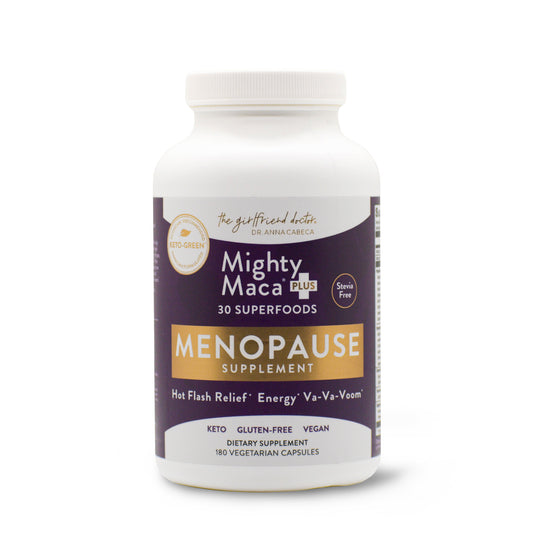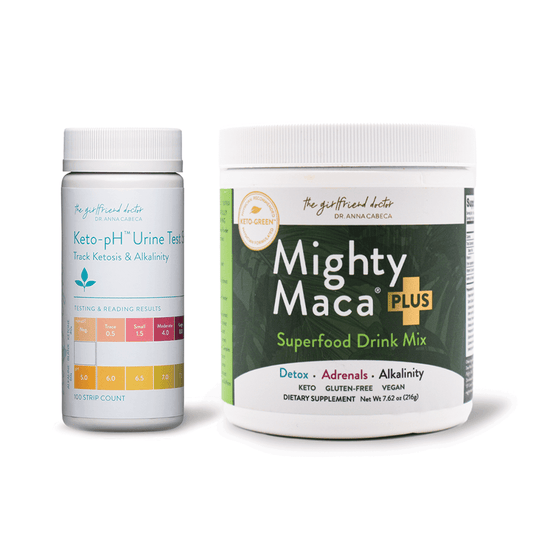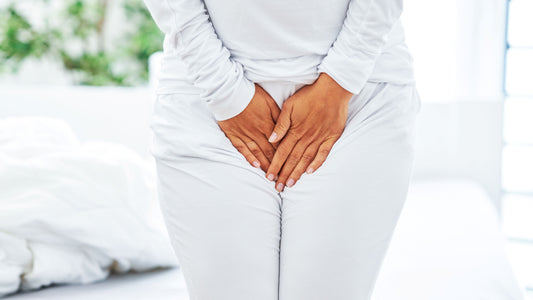You’re Not Alone—And You’re Definitely Not Broken.
Let’s talk about something that’s common, but rarely discussed: how intimacy changes during menopause. Maybe it starts with a little discomfort. Maybe you notice you’re not feeling "in the mood" like you used to. Or maybe your partner’s confused—and so are you.
If that sounds familiar, you’re in the right place. As a triple-board-certified OB-GYN, I’ve helped thousands of women navigate these changes with science, compassion, and a little bit of humor. And as someone who experienced early menopause at 39, I’ve lived this journey too.
I want you to know: you are not alone, and what you’re experiencing is normal —but it isn’t inevitable, and you don’t have to just “live with it.” There are real, practical, and empowering ways to thrive in your relationships and your body.
In This Article, You’ll Learn:
Why intimacy shifts during menopause—and what’s really behind it
What you can do today to feel confident, connected, and comfortable again
How Julva®, Mighty Maca® Plus, and lifestyle changes work together to support your journey
What other women wish they had known sooner
Science-backed answers to your most frequently asked questions

You may have heard it’s all about estrogen—and while that's part of the puzzle, it’s not the whole story.
What Really Happens:
- Estrogen drops, leading to vaginal dryness, thinning skin, and discomfort.
- DHEA declines, impacting skin resilience, sensation, and even desire.
- Progesterone and testosterone levels shift, affecting mood, sleep, and libido.
- Stress and cortisol rise, blunting oxytocin (your bonding hormone).
- Life transitions—like aging parents, career changes, or an empty nest—add new emotional layers.
👉 According to the North American Menopause Society, 50% of postmenopausal women experience vaginal symptoms, yet fewer than 25% seek help. In other words, this is normal, but it doesn’t mean you have to just live with it.

Try: Julva®
A hormone-free, doctor-formulated feminine cream with DHEA and Alpine Rose Stem Cells
Designed to moisturize, smooth, and support your most delicate skin
Safe for daily use, and yes, it can be applied before intimacy
SHOP HERE
"I had my doubts... but I felt a difference in just a few days." – Verified Julva user
Julva is a cosmetic moisturizer that enhances skin appearance, hydration, and comfort. It is not intended to treat or prevent disease.
HOW JULVA® FITS INTO YOUR ROUTINE
- Use a pea-sized amount daily on external vulvar skin (never internally)
Make it part of your morning self-care ritual, just like you would a facial moisturizer
Safe to use with hormone therapy or other vaginal moisturizers
For a hormone-free option, consider Velvè

When your hormones shift, it can feel like your spark disappears. Let’s get it back.
SUPPORT FROM THE INSIDE OUT WITH:
Mighty Maca® Plus
30+ superfoods including maca root, turmeric, and flax
Supports energy, metabolism, and hormone balance
Doctor-formulated for women in perimenopause, menopause, and beyond
SHOP HERE
🧠 DID YOU KNOW?
A 2015 double-blind placebo-controlled study found that maca significantly improved sexual function in menopausal women (Brooks et al., Menopause journal).
MY FAVORITE MORNING RITUAL:
Stir a scoop of Mighty Maca® Plus into your Keto-Green® Shake for a nutrient-rich breakfast that balances blood sugar, boosts mood, and supports energy all day.

This journey isn’t just physical. It’s emotional, relational, and deeply personal.
Intimacy is about connection—to yourself, your body, and your beloved.
Intimacy-Boosting Habits
Prioritize oxytocin: Cuddle, laugh, dance, or simply hold hands. Oxytocin is your “bonding hormone” and naturally lifts desire and connection.
Do pelvic floor exercises: These are not just for leaks—they also improve blood flow, sensation, and confidence.
Minimize stress: Try 4-7-8 breathing, walks in nature, or journaling. Chronic stress is a major libido killer.
Use mirror work: Look at yourself with compassion, not critique. Practice saying one kind thing to yourself every day.
Communicate openly: Share your feelings and needs with your partner. Intimacy begins with emotional safety.
"I used to avoid mirrors. Now, I smile when I see myself again." – Member of the Girlfriend Doctor Club
🧘♀️ Consider joining our Girlfriend Doctor Club for guided challenges, support, and community.

Menopause can actually open the door to a new chapter of intimacy—one that’s less about performance and more about connection, play, and exploration.
Explore sensual touch without a goal.
Try new forms of connection: massage, shared baths, or simply cuddling with no agenda.
Remember, pleasure is about the journey, not just the destination.
Intimacy is not just about intercourse. It’s about feeling seen, valued, and cherished.
WHAT OTHER WOMEN WISH THEY HAD KNOWN SOONER
You are not alone in your struggles—or your hopes for more connection. Over the years, women have shared these truths with me:
"I wish I had asked for help sooner. I thought it was just me."
"Once I started using Julva, I realized how much I’d been missing."
"Talking with other women going through this made me feel normal—and hopeful."
"I learned that libido starts with how I treat myself, not just what happens in the bedroom."
Your story is still unfolding, and you have more options than you think.

Q: What is the best way to improve intimacy after menopause?
A: Start by nourishing vaginal and vulvar tissue with a quality moisturizer like Julva®, balance hormones with adaptogens like maca, and focus on emotional connection and communication.
Q: Are there natural remedies for menopause intimacy issues?
A: Yes! DHEA-based creams, maca root, lifestyle practices that reduce stress, and pelvic floor exercises all support intimacy and comfort.
Q: Can intimacy actually improve after menopause?
A: Absolutely. Many women discover a deeper connection and pleasure once the pressure and expectations of earlier life fade away.
Q: Can I use Julva if I’m on hormone therapy?
A: Yes, Julva is non-prescription and designed to be safely used alongside bioidentical or conventional HRT. Always talk with your provider if you’re unsure.
Q: How long before I see results with Julva?
A: Many women feel a difference in comfort within the first week. Skin hydration and confidence often continue improving over 4–6 weeks of consistent use.
Q: What if I’ve had breast cancer or can’t use hormones?
A: Julva does contain DHEA, so check with your oncologist. For a hormone-free option, we also offer Velvè—a clean, plant-based moisturizer.
Q: What if I’m feeling disconnected from my partner?
A: Start with self-connection first. Consider trying the Sexual CPR program, which blends science, communication tools, and self-discovery.
Q: Is it normal to feel less sexual desire during menopause?
A: Absolutely. Hormonal changes, life stress, and even body image shifts all play a role. With support, most women find that their desire and pleasure can return—even stronger than before.
Science-Backed Solutions That Work
Why Moisture and Hormone Support Matter
Vaginal and vulvar dryness isn't just inconvenient—it can make intimacy uncomfortable or even painful.
DHEA-based creams (like Julva) have been shown in clinical studies to improve tissue resilience, moisture, and pleasure.
Maca root, as found in Mighty Maca® Plus, supports mood, energy, and sexual function through adaptogenic effects on the endocrine system.
Why Addressing Stress Is Essential
Chronic stress increases cortisol, which lowers oxytocin and testosterone—both critical for desire and emotional closeness.
Simple practices like deep breathing, mindfulness, and gentle exercise support nervous system regulation and improve intimacy.
Your Next Right Step
✨ Here’s what I recommend:
Take the Vajayjay Quiz to get a custom recommendation based on your body
Join the 16-Day Keto-Green Meal Plan to nourish your hormones
Try Julva Trial Pack and see the difference for yourself
You deserve to feel connected, confident, and vibrant—at every stage of life.
"Menopause is mandatory. Suffering is optional." Let’s choose comfort, confidence, and connection—together.










